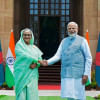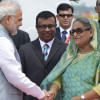Takeaways: Hasina-Modi Talks

Our concerns were largely unaddressed
The statements from the two leaders of Bangladesh and India appear to be quite ambitious. However, they don't address the challenges that the people of Bangladesh face.
The issue of sharing Teesta water did not come up. India has spoken about sending a technical team to look into how the Teesta water in Bangladesh can be conserved and managed, but how long it will actually take to ensure that the people in Bangladesh get enough water in the northwestern region remains a serious question. We know that China was interested to fund the Teesta management project, but now with India coming into the scene, it appears that the project would get stuck indefinitely.
Border killings have been an issue of concern for Bangladesh for long but regrettably, it has not seen any improvement. I also do not think that is going to improve anytime soon.
The two countries spoke of joint production of small satellites. I do not think Bangladesh has the funds to go for satellite production. Also, the purpose of the satellites is not clear. We should go for investments based on real needs. Do we really need a satellite?
Delhi extensively spoke of defence cooperation. I am not sure how far it can go. We are not sure what India will manufacture. The country buys most of its sophisticated defence equipment from abroad and jointly produces missiles with Israel. I don't think India will go for joint missile production with Bangladesh. What can best happen is that the two countries can jointly produce ammunition.
The railway transit that was spoken about suggests that India wants to restore the rail communication as it was before 1947. However, we need to see how much funds are required for that. This transit, though close to the borders of Nepal and Bhutan, will mostly benefit India. I do not know how it will benefit Bangladesh. As we already have high loan burdens, I do not think we should take further loans for projects that don't serve the best interests of the Bangladeshis.
I think this visit is a reflection of close relations between the two governments, both of which have entered a new term. Prime Minister Sheikh Hasina will go on a China visit soon and things will become clearer after that.
Prime Minister Hasina and Indian Prime Minister Modi had one-to-one meeting. We don't know exactly the content of the meeting. However, we assume that India has shared with our prime minister its concerns about China.

Visit long on visions, short on details
The statements from the meeting suggest we have moved from resolving smaller bilateral issues, which traditionally dominate the relations, to bigger visions and broader strategic aspects. There are definitely some positive outcomes from the visit, on which both Bangladesh and India can build up the future cooperation. At the same time, some of the lofty ideas are too complex to have their possible implications deciphered.
Energy cooperation with Nepal and Bhutan through India could open up a strategic window for all four countries. We have never tried to look into regional energy cooperation. It was run more on a bilateral basis. So, I think it has moved to a sub-regional direction, which is a welcome move. We must see to it that such a process offers equitable benefits to all parties.
Likewise, the decision for the early commencement of negotiations on CEPA (Comprehensive Economic Partnership Agreement) is a welcome move by the two leaders. It is our hope that once agreed upon, the CEPA will create a dynamic for improving the bilateral trade and investment, and address the current challenges we face. Meanwhile, it is our earnest hope that India will take urgent steps to remove the non-tariff and para-tariff barriers to facilitate export of products from Bangladesh.
The formation of a technical committee to initiate discussions on the renewal of the Ganges Water Agreement is also a positive development. However, the decision to send a technical delegation on the management and conservation of Teesta inside Bangladesh is a little unclear. Except a line in the Indian statement -- "We will continue to engage in prioritising the exchange of data and formulating the framework for interim water sharing based on the recommendations of the Joint Rivers Commission" -- there is no mention on the signaling of the Teesta agreement, which has remained pending for the last 13 years despite commitments from India's highest political level.
It is important that the water-sharing agreement captures the fundamental right of Bangladesh to the waters of all common rivers flowing between the two countries, and as such, it cannot be ignored under any circumstances. The formulation also does not touch upon the earlier agreement to deal with the water management issue on a basin-wide approach.
Connectivity by bus, rail, cargo through Bangladesh has a strategic dimension to it. India is creating an alternative connectivity to its northeastern region through Bangladesh. This is fine, but what benefit Bangladesh would get from this access is unknown. There is a strong perception in Bangladesh that over the last few years, whatever the connectivity projects have been implemented are mostly for the benefits of India. I think it would be better to make an assessment on the cost and benefit of these projects.
In the statement, India says that Bangladesh is at the converging point of its Neighbourhood First policy, Act East Policy, SAGAR Doctrine, and Indo-Pacific vision, and the intention as reflected therein to integrate Bangladesh in the development of India's northeastern region and beyond is obvious.
Bangladesh has also announced its vision in the form of Indo-Pacific Outlook, which prioritises inclusiveness and economic collaboration. It remains to be seen how the Indian vision and Bangladesh outlook can work side by side in the context of growing competition in the region. Prime Minister Narendra Modi has highlighted India's interest for defence cooperation and modernisation of defence equipment in Bangladesh. One only hopes that such cooperation will remain consistent with the foreign policy objectives of Bangladesh.
The decision to issue e-visas for medical purposes, and bus services from Rajshahi and Chattogram to Kolkata are also welcome initiatives, which will benefit the common people of both Bangladesh and India.
Overall, the visit was long on vision and short on details and roadmap for resolving the bilateral issues between the two countries.

 For all latest news, follow The Daily Star's Google News channel.
For all latest news, follow The Daily Star's Google News channel. 








Comments